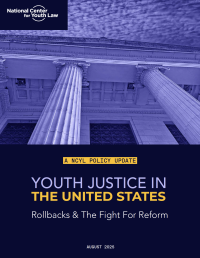California Commits Nearly $60 Million To Divert Youth Away From Jails, Toward Supports
The National Center for Youth Law, through collaborations with lawmakers and community groups, was instrumental in California committing nearly $60 million to programs that divert youth away from jails and assist them toward healthy and appropriate supports.
The funding was made available in 2019 and 2020 through the NCYL-sponsored Youth Reinvestment Grant, Tribal Youth Diversion, and Fostering Success Funds. The funds help support community-based, culturally rooted, trauma-informed services for youth in California as alternatives to arrest and incarceration.
This funding was critically important, as tens of thousands of California youth are arrested every year for low-level offenses. Youth who are arrested or incarcerated for low-level offenses are less likely to graduate high school, more likely to suffer negative health-outcomes, and more likely to have later contact with the justice system. Evidence has repeatedly shown that providing community-based services instead of arresting and incarcerating youth improves outcomes for youth and increases public health and safety.
A look at how this landmark funding was distributed:
Youth Reinvestment Grant
The Youth Reinvestment Grants (YRG) were one-time state expenditures of $37.3 million in 2018 and $4 million in 2019, to be distributed over three-year grant periods, to organizations that support community-based, trauma-informed, culturally relevant, developmentally appropriate, and health-based diversion programs.
Communities with high juvenile arrest rates and high racial and ethnic disparities in juvenile justice system involvement were given priority for funding.
Fostering Success Fund
The Fostering Success Fund allocated $4 million in 2018 over a three-year grant period to support foster youth who are at risk of being criminalized for minor misbehaviors and low-level offenses.
A portion of the funds were made available for training local law enforcement, group home and shelter staff on alternatives to arrest and responses to youthful behavior, including de-escalation techniques. The majority of the funds were restricted for community-based, culturally relevant, trauma-informed services for foster youth as an alternative to arrest and incarceration.
Tribal Youth Diversion
Allocated $11 million dollars $1 million in 2018 and $10 million in 2019 - in State general funds to Federally Recognized Tribes to develop and expand pre-arrest diversion programs and trauma-informed community-based services for Native American youth on tribal lands.
Benefits of diversion
In 2016, more than 40,000 California youth were arrested or cited by law enforcement officers for misdemeanor and status offenses. A disproportionate number were children of color, children from lower socio-economic backgrounds, children with disabilities, girls, youth who identify as lesbian, gay, bisexual, transgender, or queer, and foster children.
This is troubling because system-involved youth suffer from abuse, abandonment, neglect, trauma and developmental disabilities that influence their behaviors. Rather than receive supports and services to address their needs, they are instead funneled into the justice system where they experience further harms, increasing their chances of re-incarceration.
Youth need care, not cages. NCYL supports California’s commitment to create local youth diversion and development systems that are socially and fiscally responsible by treating all children arrested for low-level offenses appropriately for their age, in community settings, and with an emphasis on health and wellbeing.






